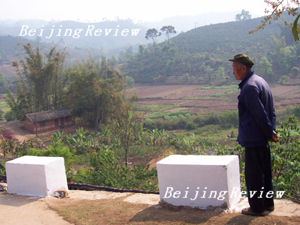
Living in the epicenter of Beijing, rarely making it past the second of the six arterial ring roads that encircle this sprawling, swelling city like a dartboard, a person could be forgiven for forgetting that the country of China is mostly countryside.
And most of its citizens are country folk. As often mentioned, China has about 900 million rural people, most living in poverty and many in increasing unrest over their living conditions and the injustices that happen to people who are poor and powerless.
Which is why there has also been so much talk recently over the construction of China's "new socialist countryside," the term used by government officials to describe the investment being made to reduce the staggering disparity between rural and urban residents. China's leaders are well aware of the problem.
Once you make it out of Beijing or any other big city, the problem is there and everywhere. The countryside seems to never end, and, at least outside Beijing, it is shockingly ugly. Dusty brick village after village set in a dead, colorless landscape, inhabitants clumped together on dirt roads with little infrastructure and opportunity.
But China is a huge country, and the countryside is complex.
Recently, on a trip to southwestern China, I traveled to villages in Yunnan where the beauty of that province, with its lush forests and sweet air, makes it easy to forget that it is also very poor (the mountains and forests are spectacular, but they don't leave much room for agriculture).
The Yunnan countryside is colorful and culturally diverse, and by extension more tourist-friendly. Tourists also see the drab villages outside Beijing on the way to the Great Wall. Going on sheer looks, I find it hard to believe these places are in the same country.
So, how to solve the rural problems of these two very different parts of the country with one strategy?
No simple solution, though the terminology is an easy divide--too easy. In China, a line is drawn by the blanket terms of urban-rural, city-countryside.
The lexicon is confusing to me in this way. The term "farmer" is used by my urban Chinese friends, when speaking English, to describe those on the unfortunate side of the divide. "Farmer," not "peasant," a term with different connotations.
For example, on that recent trip to China's southwest, local officials in one small-sized city trotted out a woman to be interviewed, whom they described as a farmer. She was a woman in her 50s who lived in a roomy apartment in the downtown core, with two TVs and a black leather massage chair, and owned a clothing shop at ground level.
I was confused. What, exactly, made this woman a farmer? I finally learned it was because she held a rural hukou, or household registration. No matter her current living conditions-she still isn't considered an urban resident, just a farmer done good.
In comparison, in another village I was introduced by local officials to a farmer with a weathered face who grew coffee beans with help from his son and daughter-in-law and spoke of the family's high costs for medical care. In his dusty cap and blue jacket, he was what many people would picture when they think "Chinese farmer."
Despite the obvious differences, both this man and the woman with the massage chair are painted with the same brush.
I saw poor villages in the southwest, many of them. And I was taken to rich villages, the odd ducks that have made their money off booming enterprises and industries such as tobacco. Even the few well-off places ran the gamut from a really rich large village, where drivers cruised on paved roads past tasteful landscaping on the meridians, to another, smaller village that had a new paved walkway that at least seemed to make life easier for the old women carrying firewood down from the hills in bundles on their backs.
The comparison made recently to illustrate the divide in China is that the cities in China are like those in Europe, while the countryside is like Africa.
Of course, as noted by others, the situation in China's cities and countryside is neither as good nor as bad as that.
Apart from the yawning gap between rich and poor, it is the scale and diversity of the rural areas, not to mention the gigantic population size spread throughout, that I find staggering. Coming from a country with huge spaces and so few people, I find it unimaginable to think of a similarly large landscape filled with endless poor peasants. Even in my country, which has socialist leanings, ample resources and few people, there is still poverty, albeit on a much different scale.
"Village" and "city" hold different meanings in China, in my mind. I joke, but only sort of, that a village in China would be a small city in Canada. A small Chinese city would be a booming Canadian metropolis.
I can't even conceive of the work required to revamp China's expansive countryside, in all its complexities. There is no easy, one-size-fits-all solution.
But here it begins, Chinese officials say. And the hard work the government has committed to undertaking in the coming years will be something not to be missed. Just drive in any direction outside any big city and you'll see what I mean.
Erin Conway-Smith is a Canadian living in Beijing.
| 